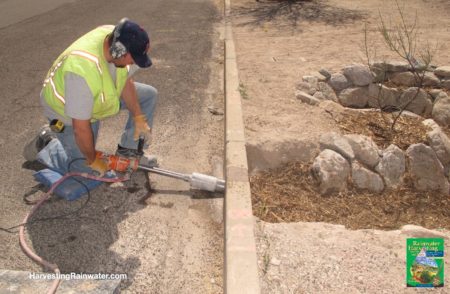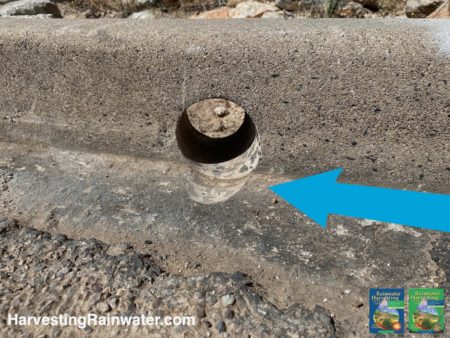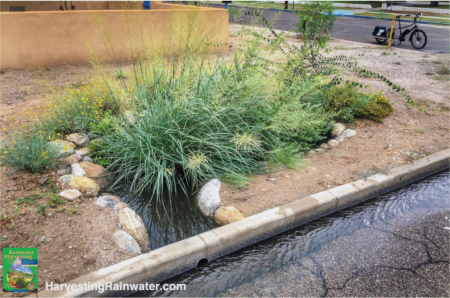Dunbar Spring (and West University) Neighborhood
Rain Planting and Curb Coring Service flyer 2024
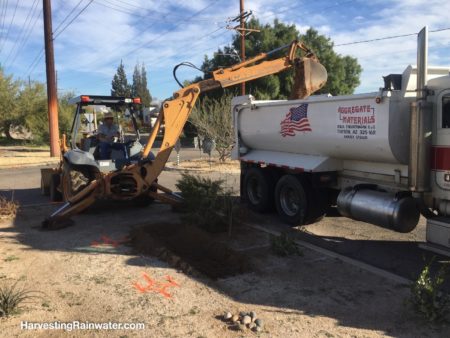
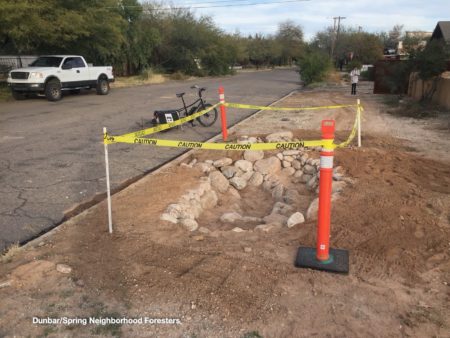

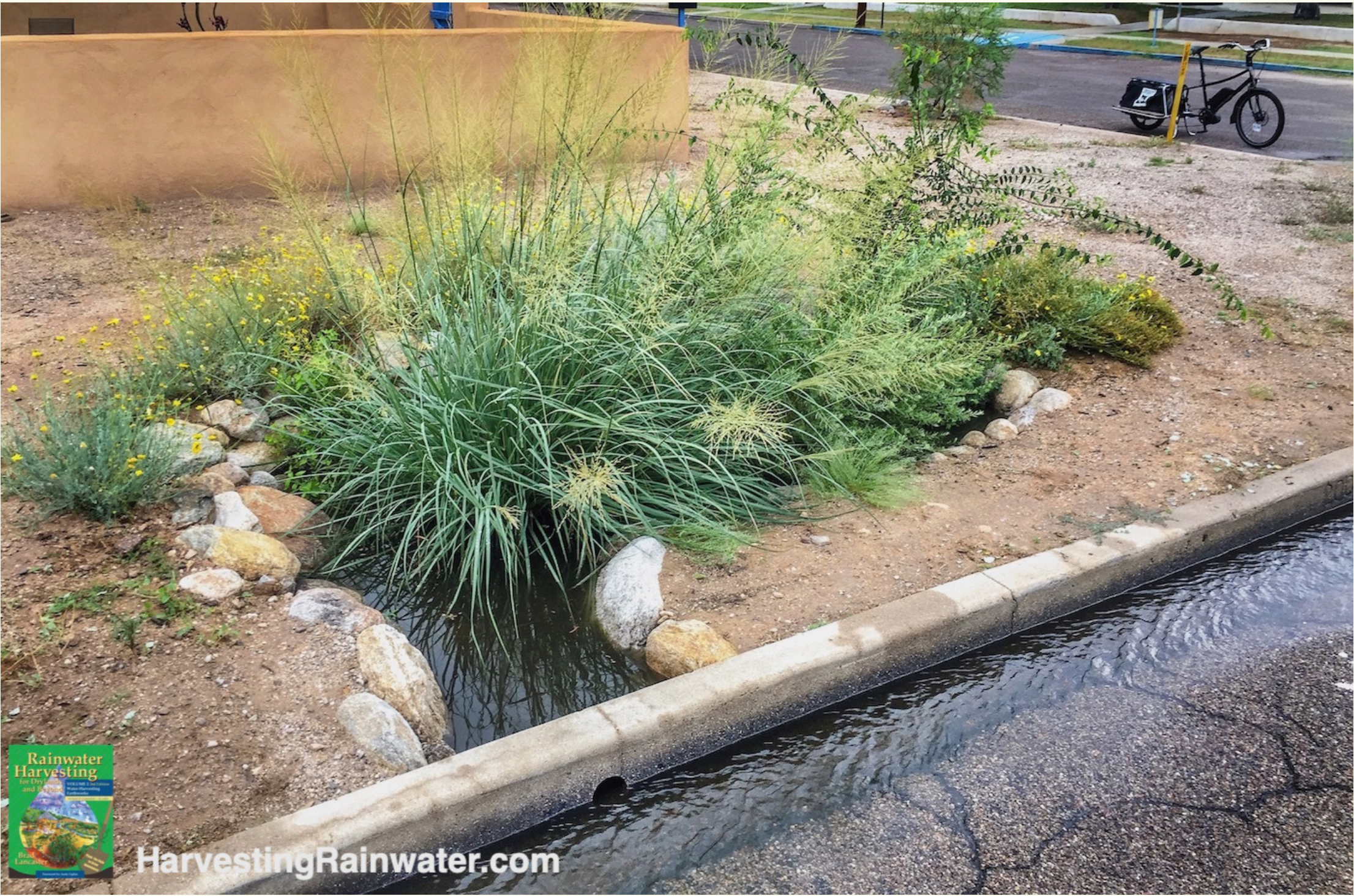

First step:
Sign up on the Neighborhood Foresters Contact page here
Second step:
Fill out, sign, & return this maintenance/stewarding agreement to NeighborhoodForesters@gmail.com.
Third step:
If you want to qualify for Tucson Water’s rainwater harvesting rebate or the low-income water harvesting grants and loans (as of July 1, 2023) you are required to take an eligible free workshop BEFORE installation of your system.
Implementation is planned for winter, exact dates in early 2024 will be announced once we have the permits.
Since 1996 this program has coordinated neighborhood & community volunteers to plant over 1,700 trees in the public rights-of-ways of the Dunbar/Spring neighborhood, along with thousands of understory plants. These plantings are freely irrigated by rain and stormwater passively harvested within water-harvesting earthworks. All these neighborhood earthworks combined annually harvest over 1 million gallons of stormwater, that previously wastefully drained away.
In 2020 through 2023 we even expanded into the adjoining neighborhood of West University – we plan to do the same in 2024.
We could also expand into another adjoining neighborhood if we get a resident from that neighborhood to step up and collaborate with us.
These plantings save you and our community water and money; grow shade, cooling, and comfort; help recharge our local groundwater; reduce flooding; sequester carbon; provide wildlife habitat; improve soil fertility; grow food, fiber, fodder, and beauty; build community; and enhance quality of life for everyone.
Let’s keep it going and expanding – invest in, and help steward, the pocket of the community forest adjoining your home, business, school, or organization now!
First – we plant the rain!
WATER-HARVESTING-BASIN-CREATION SERVICE:
Once again, we are working with licensed contractors (John Litzel of Little John Excavating and Jeff Rhody of Dryland Design) to:
• Dig street-side basin(s) [average size is 5 to 8 feet long x 5 feet wide x 1 foot deep] with a backhoe
• Remove excavated soil with backhoe and dump truck
• Deliver and hand-set local Catalina granite rock to stabilize the basin banks and planting terraces. (Those wanting to learn how to set rock and work with, and learn from, the contractor may have this opportunity – contact Brad if this interests you).
• Drill core holes in the street curb to direct street runoff into the street-side basin for a lifetime of free stormwater irrigation and flood control
• Apply organic-matter mulch to basins derived from composted goat pen bedding and manure from neighborhood goats that eat neighborhood prunings
• Handle the permitting
• Plant selection, design, & placement within the ideal rain garden planting zone.
Costs
Average price (after City Rainwater Harvesting Rebate) is expected to be $650 – $900 per basin.
Actual average cost without rebate is $1,300 – $1,500 per basin with curb coring, but the rebate covers half the cost.
Low-income grants and loans also available
New revision has increased the rebate
In the past, the City Rainwater Harvesting $2,000 rebate was limited to $500 for passive water-harvesting systems (systems without tanks), but the Dunbar Spring Neighborhood Foresters program now qualifies for the full $2,000 rebate for passive systems!
To get the rebate
As of July 1, 2023, Tucson Water customers applying for a rainwater harvesting or gray water harvesting rebate will be required to take an eligible workshop before installation of their system.
Amazing deal
Even without the rebate, this program is an amazing deal, but with the rebate it is even more amazing! The average basin can capture over 4,500 gallons of stormwater per year (assuming average annual rainfall of 11 inches). Trees and other plantings planted with such basins grow to be healthier and larger, and have faster growth rates than those without such basins. And the basins bottoms and planting terrace can be seeded or planted with beautiful native understory plantings. See here for ideas of understory plantings and their ideal planting location.
This basin creation price is lower than market rates because we are able to get a bulk deal by pooling many installations and permits into one—it pays to collaborate as a community! We coordinate the design services, underground utility markings, permitting, inspection, and contracting so you don’t have to!
Excavation is done by a backhoe and operator, excavated soil is removed from site (unless homeowner wants to use it elsewhere on property), and includes rock, professional rockwork, curb coring, and mulch. The basins have high capacity – resulting in far more free irrigation stormwater, groundwater recharge potential, and more flood control.
You can see an example of Dryland Design’s rockwork at street side basins in front of 236 W. University Blvd. and the northeast corner of 10th Ave and 2nd Street., along with photos below.
PLANT ORDER AND DELIVERY:
Native trees (5-gallon size) cost $32 each.
Understory plants (1-gallon size) cost $12 each.
Native wildflower & restoration seed is $10.
Organic-matter mulch is $10 per basin.
Trees, understory plants, and native wildflower & restoration seed are all planted at the same time. This makes irrigating them all (to get them established) much easier as you are already irrigating, and quickly establishes a living sponge of beautiful, sheltering, wildlife-supporting, vegetation including edible and medicinal species.
The mulch is applied after planting to enhance plant and soil health while increasing water infiltration and decreasing water loss to evaporation.
You are expected to participate in the planting along with other community volunteers – deepen your roots and get to know your plants and neighbors.
EXISTING WATER-HARVESTING BASIN EXPANSION SERVICE:
The basin creation service can also be used to enlarge or enhance existing (but perhaps undersized) basins.
Price depends upon how much the basin is enlarged or enhanced.
WATER-HARVESTING CURB-CORING SERVICE:
Average cost per 4-inch diameter core hole drilled is $80. A fantastic deal, because once done you get free stormwater for life – as long as you keep the core inlet clear of debris.
ALL TREE, BASIN, AND CURB-CORING ORDERS MUST BE IN BY:
November 6, 2023.
TO SUBMIT YOUR ORDER:
• Email Brad at NeighborhoodForesters@gmail.com to get on the list, send him your Maintenance/Stewarding Agreement filled out and signed for every address ordering trees.
• Make sure you meet the requirements go get the help of the Dunbar/Spring Neighborhood Foresters program in the section below.
If you want to participate in the rebate program, sign up for the free three-hour water harvesting class (you must take the class before we do the work).
Brad will then schedule a time to meet with you on site to plan the scope of work and plant selection.
Requirements to get the Rain and Tree Planting help of Dunbar/Spring Neighborhood Foresters program:
1. Invasive weeds must be removed from all areas you want to plant rainwater and trees BEFORE the rain and trees are planted.
2. Must have a continuous pedestrian path minimum 5-feet wide, cleared to a height of 7 feet, and having an approved path surface in the public right-of-way adjoining your property.
If you don’t already have this, we can create it for you with the help of our contractors.
Approved pathway materials that maintain public access and walkability:
• Compacted native soil. Free and already on site!
• Screened organic material (woodchip) mulch no larger than 1/2-inch in particle size.
(Do not apply mulch thicker than a 1-inch depth. Thicker depths bog down small wheels of babycarriages and wheelchairs).
One local mulch supplier is Tank’s Green Stuff.
• Compacted or stabilized ¼ to 3/8-inch minus decomposed granite (DG).
There are natural polymers that can be mixed in with the decomposed granite to better hold it together and stabilize it. DG is available from local landscape material suppliers. (Gary Wittwer, past Landscape Architect, City of Tucson Transportation Department told me this can be installed to be American Disabilities Act (ADA)-accessible
• Pavers/brick, which can be installed within the grade/slope tolerances of the ADA
• Maintained concrete sidewalks (ADA-accessible)
Non-approved, non-accepted path materials that inhibit public access and walkability:
• Loose rock or gravel
• Decomposed granite larger than 3/8-inch in particle size
• Course organic material (woodchip) mulch larger than 1-inch in size; or organic mulch thicker than 1-inch depth.
NOTE: If you would like trees for planting on private property,
• Choose the native trees and understory plants you want by filling out and handing in (with payment) our order form.
Alternatively, you can also visit https://tucsoncleanandbeautiful.org/trees-for-tucson/ or call (520) 791-3109. Native and fruit trees are available (ideally you set up a greywater-harvesting system for these fruit trees first, as they will require more water than native trees as well as regular watering in the hot and dry seasons). Note that the City of Tucson has a greywater-harvesting rebate covering up to half the cost of a greywater system with a rebate cap of $1,000.
Dunbar Spring (and West University) Neighborhood
Rain Planting and Curb Coring Service flyer 2024


